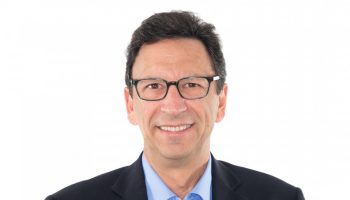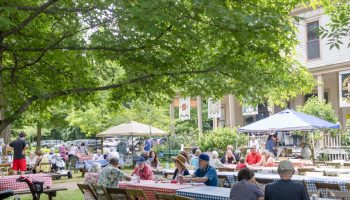This past week was an incredible start to the season as we explored the theme of friendship from our stages. I am proud to say that I suggested and championed this weekly theme, “On Friendship”, because I feel strongly that friendships across difference can radically transform our divided society. Cornel West and Robert P. George were living examples of how we might transcend boundaries – racial, ideological, political, to name a few – and seek a deeper relationship based in love and understanding.
I know from the questions that surfaced this week that some of us were interested in learning more about the human and scientific aspects of friendships across boundaries, and particularly around interracial friendships. This topic emerged during the first three morning lectures during the Q-and-A section. My deeper read of this recurring question is that many of us seek these friendships, but perhaps not all of us have been successful at translating this desire into action.
This thread of questions got me thinking: What keeps us from creating and sustaining deeper friendships across boundaries? Marisa G. Franco’s research offered us some insights. She posited that there are three key conditions for organic friendship: Proximity, repeated interactions, and environments that lead us to confide in friends. These three factors made a lot of sense and certainly apply to my own experiences. They can also help us understand the barriers to interracial friendships.
If we live, work or vacation in homogeneous environments, we are less likely to encounter others who look, think or act differently from us. If proximity is a barrier to begin with, then we can assume that our ability to have repeat interactions is also going to be constrained. This alone should be a clear call for us – all of us – to work toward creating a more diverse Chautauqua community. It also means that we might have to work with intentionality to initiate these friendships, whenever those opportunities might present themselves. Perhaps the most compelling idea that Professor Franco presented was that our self-fulfilling fear of rejection can often keep us from developing new friendships. This fear of rejection might exist for all new friendships, but it might be especially pronounced when we are seeking those bonds across difference.
If fear is the darkness that stagnates us, then where is the light? Cornel West offered a deep insight in this regard: “It is only up to those of us who make the choice of love and light, which means the choice of being willing to take the risk.” My dear Chautauquans, I implore you to reject that fear, ignore that voice that feeds your anxiety and instead take the risk of initiating something new. The rewards likely will outshine the risks.
In practice, what might this look like? I will remind you from last year’s columns that the two places where things go wrong in initial interactions with diverse Chautauquans are 1) making assumptions, or 2) starting a conversation by highlighting differences. Instead, we can start with common ground. All people come to Chautauqua for their love of most (if not all) of our pillars: arts, education, religion and recreation. Let’s start there. Seek friendship over a shared love of the symphony. Start a conversation based on our shared appreciation for the offerings of the Bird, Tree & Garden Club. Sit next to someone you don’t know during a climate change talk. They are likely there because they care about similar things. Seek that commonality – the common light – to help grow that friendship organically. If we find our commonality first, we will be able to negotiate the differences with thought and care.
In last week’s column, I shared that I alone cannot transform Chautauqua to be a more diverse and inclusive community. I invite you to imagine a future Chautauqua where we all get to contribute a small amount by engaging in everyday, transformational practices. If we all work together to create that sense of belonging and inclusion in our everyday lives, we truly will be able to live out our shared institutional mission of “the exploration of the best in human values and the enrichment of life.” Thank you for being my co-travelers on this journey, and may we all grow new connections and diverse friendships in the years to come.
Amit Taneja
Senior Vice President
Chief Inclusion, Diversity, Equity & Accessibility Officer





